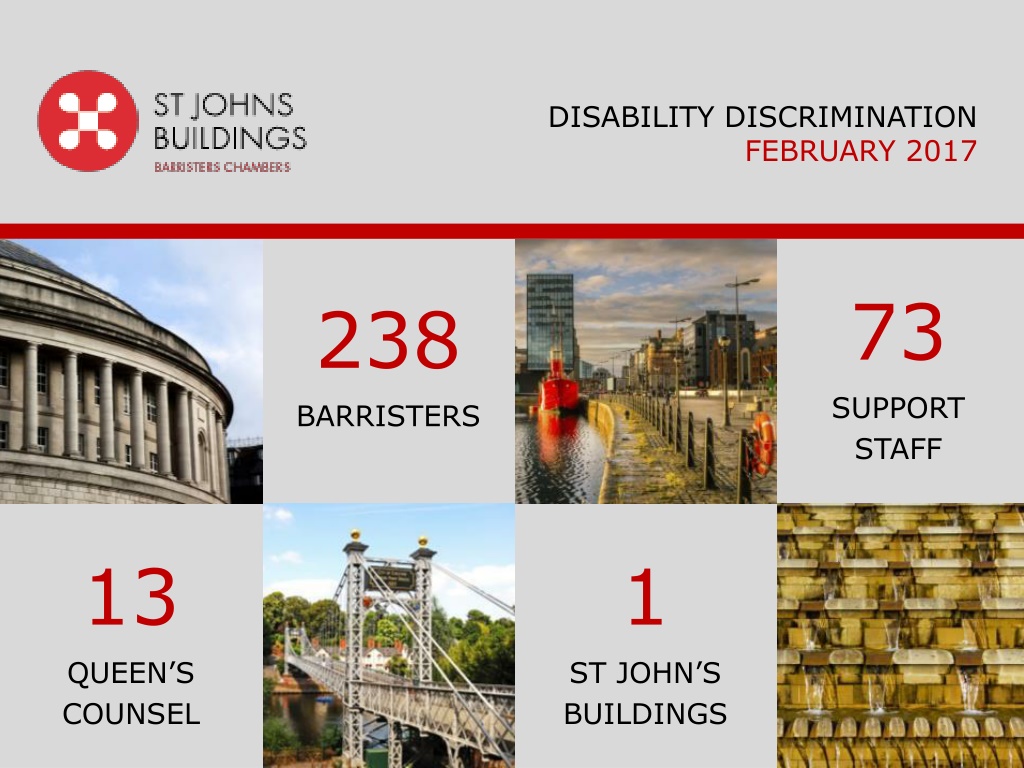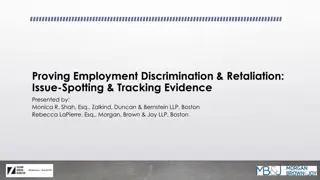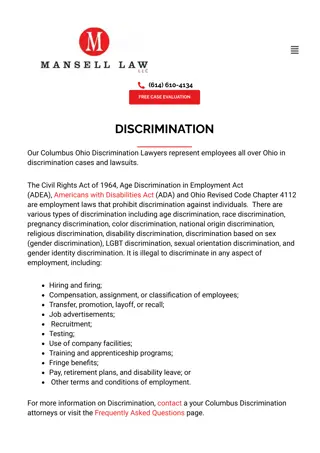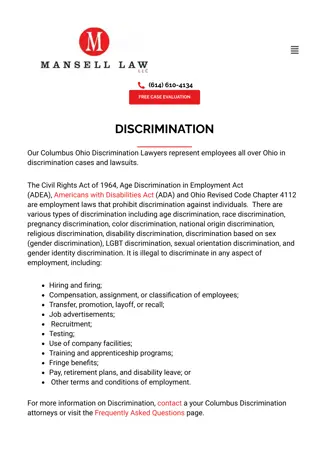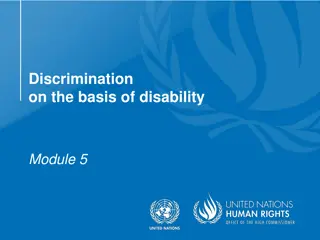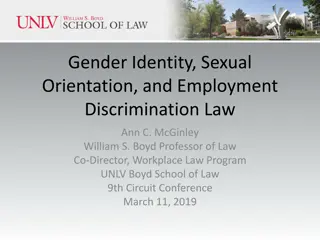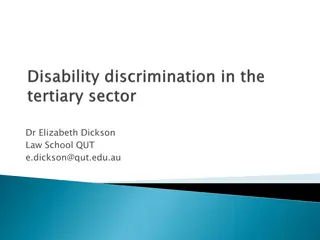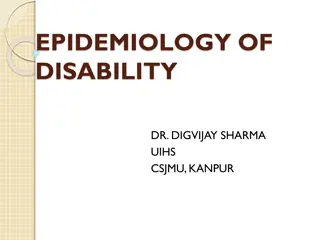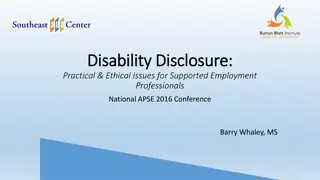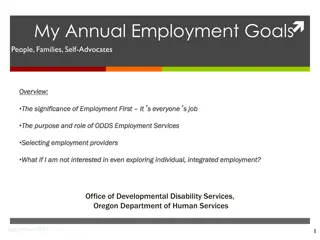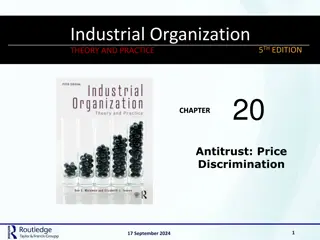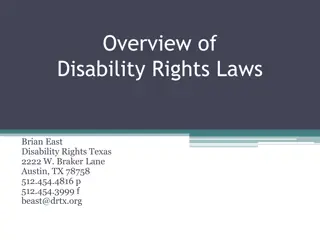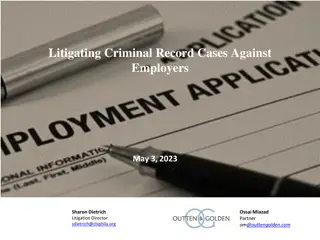Employment Law Cases Update: Disability Discrimination - February 2017
Private Medicine Intermediaries Ltd v. Hodkinson involved a case of constructive unfair dismissal and harassment due to a disabled employee being pressured to work long hours. The Employment Appeal Tribunal ruled that the expectation for the employee to work long hours constituted a discriminatory practice. In Carreras v. U, a similar situation arose where a disabled employee resigned after being pressured to work late. However, the tribunal found no failure to make reasonable adjustments as there was no explicit requirement for long hours.
Download Presentation

Please find below an Image/Link to download the presentation.
The content on the website is provided AS IS for your information and personal use only. It may not be sold, licensed, or shared on other websites without obtaining consent from the author. Download presentation by click this link. If you encounter any issues during the download, it is possible that the publisher has removed the file from their server.
E N D
Presentation Transcript
DISABILITY DISCRIMINATION FEBRUARY 2017 73 SUPPORT STAFF 238 BARRISTERS 13 QUEEN S COUNSEL 1 ST JOHN S BUILDINGS
DISABILITY DISCRIMINATION CASE UPDATE Richard Carter
PRIVATE MEDICINE INTERMEDIARIES LTD AND OTHERS V HODKINSON Employment Appeal Tribunal (EAT) heard an appeal on whether the Claimant had been constructively unfairly dismissed and harassed when the employer had written to her whilst she was off sick. The EAT also had to decide whether this was discrimination arising from disability. Whilst on sick leave in October 2013 with work related depression and anxiety, attributed by the Claimant to bullying, the employer wrote to her asking whether she wished to raise a grievance and offering to meet her to discuss her concerns. The Claimant wrote back stating that she was in no fit state to communicate without breaking down and that she felt distraught by the treatment she had received. After taking legal and HR advice the employer wrote again to the Claimant proposing to meet before the end of the month; they had carried out an investigation and raised six areas of concern with her work they wanted to discuss. The Claimant then tendered her resignation due to a breakdown in trust and confidence and stated that the timing and nature of the issues raised and the six areas of concern were intended to elicit her resignation. She brought claims for harassment, discrimination arising from disability, failure to make reasonable adjustments and constructive unfair dismissal. The EAT dismissed the ET's findings of discrimination arising from disability and harassment and upheld the appeal on these points. It could not say that the Claimant had suffered unfavourable treatment because of her disability. However, it agreed with the Tribunal s findings that the company s letter raised a number of concerns that were not serious and did not need to be dealt with at that stage given that it was apparent that the employee was not fit to respond to those matters, and that the letter was the reason that she had resigned.
CARRERAS V U FIRST PARTNERSHIP RESEARCH UKEAT/0266/15 The Employment Appeal Tribunal (EAT) has held that an expectation for a disabled employee to work long hours amounted to a provision, criterion or practice (PCP) for the purposes of disability discrimination. C was employed by U. Following an accident, C suffered physical symptoms which included difficulty concentrating and working late in the evenings. Before the accident, C had regularly worked long hours. On his return to work, C initially worked shorter hours but came under pressure to work later. After he was initially asked to work later, there was an assumption that he would continue to do so. C believed that he might be made redundant or lose his bonus if he did not work late. When C objected to working late in the evenings due to tiredness, M, one of the owners of U, told him in a raised voice that if he did not like it he could leave. C left the office and stated that he resigned. He confirmed this in writing. When U wrote to C reminding him of his post- termination obligations, C replied setting out his reasons for resigning in more detail. C considered that, taken cumulatively, these amounted to constructive dismissal. C brought an employment tribunal claim for disability discrimination, alleging that U had failed to make reasonable adjustments in relation to the requirement to work long hours. An employment tribunal held that U had not failed to make reasonable adjustments because the PCP pleaded by C, a requirement to work long hours, had not been made out. Although U expected or assumed that C would work late, there had been no requirement for him to do so. C appealed.
CARRERAS V U FIRST PARTNERSHIP RESEARCH UKEAT/0266/15 (CONT) Decision. The EAT allowed the appeal. An expectation can amount to a requirement. The reality of the situation was that C felt obliged to work late. U had requested that he do so and then had expected him to continue to do so. This amounted to a PCP. The claim was remitted to the tribunal for an assessment of the nature and effect of the disadvantage suffered by C and for it to address the question of reasonable adjustments. Comment. It is clear from the 2010 Act that for a PCP to be established it is not necessary for there to be a formal requirement by the employer. This EAT decision confirms this. Spoken and unspoken rules exist in all workplaces, and it is consistent with the requirements of the Equal Treatment Directive (76/207/EC) that such rules fall within the 2010 Act. In this case, there had been an express requirement to work long hours, which had over time become embedded into the culture of the workplace. What the EAT did not decide here, however, is whether a mere assumption by individuals that they are expected to work long hours (without it ever being articulated by the employer) would constitute a PCP. It will presumably depend on what the employer did or did not do to lead the individuals to come to that view. If the employer rewarded those who voluntarily worked long hours with a larger bonus is that sufficient would that enable the employer to argue that such an action, even if it was a PCP, was objectively justified? NOTE: see coming up
RISBY V LONDON BOROUGH OF WALTHAM FOREST UKEAT/0318/15 A loose causal link is all that is required between an employee's conduct and his disability to establish a discrimination arising from disability claim. Background. Conduct is a potentially fair reason for dismissal (section 98(2), Employment Rights Act 1996) (section 98). Whether an employee has been fairly dismissed depends on whether, in all the circumstances, including the employer's size and administrative resources, the employer acted reasonably in treating its reason for dismissal as a sufficient reason for dismissing the employee (section 98(4)). Discrimination arising from disability occurs where A treats B unfavourably because of something arising in consequence of B's disability, and A cannot show that the treatment is a proportionate means of achieving a legitimate aim (section 15, Equality Act 2010) (section 15). The Code of Practice gives the example of a woman being disciplined for losing her temper at work, which is out of character and the result of severe pain caused by cancer of which her employer is aware. Disciplining her would be unfavourable treatment because of something that arose in consequence of her disability, namely her loss of temper. There is a connection between the loss of temper that led to the treatment and her disability (paragraph 5.9, EHRC Code) (paragraph 5.9). Facts. R was a paraplegic employed by L. To save costs, L stopped holding workshops at a private venue with wheelchair access and held them in the basement of one of its buildings which had no wheelchair access. As a result, R lost his temper, swore and made deeply offensive racial slurs. S, a mixed-race colleague, believed that these were directed at her. R was summarily dismissed. Given his repeated use of offensive and racist language and behaviour, L did not accept that R was trying to make a point. R appealed, focusing on the severity of the sanction. L dismissed the appeal on the basis that R's behaviour was contrary to L's equal opportunities policy and because of the effect on S. R issued proceedings against L for unfair dismissal and discrimination arising from disability. An employment tribunal dismissed R's claims. It distinguished paragraph 5.9, and held that there had been no direct link between R's disability and his behaviour. R appealed.
Risby v London Borough of Waltham Forest UKEAT/0318/15 Decision. The EAT allowed the appeal and remitted the claims to the tribunal. Following Hall, R only had to establish that his conduct arose as a result of his disability. If R had not been disabled by paraplegia, he would not have been angered by L's decision to use a venue he could not access. His misconduct was the product of anger caused by that decision and his disability was an effective cause of that anger and, therefore, of his conduct. The fact that R's personality trait of shortness of temper, which did not arise from his disability, was also a cause of his conduct, did not mean that the other cause, which was related to his disability, should be disregarded. Given the tribunal's findings, there were two causes of the conduct that led to R's dismissal. The tribunal had erred in concluding otherwise and had not gone on to consider whether L's actions in dismissing R were a proportionate means of achieving the legitimate aim of ensuring and promoting its equal opportunities policy. Comment. The EAT's decision seems to loosen the causal connection required to establish discrimination arising out of a claimant's disability. Indeed, it appears to go further than the example given by paragraph 5.9. In paragraph 5.9, it was the claimant's pain caused by her medical condition which was the cause of her temper outburst. Here, R's outburst was caused by his short temper, which had little to do with this disability. His loss of temper was caused by L's failure to make a reasonable adjustment for the location of the workshop, which seems one step further removed for the situation described in paragraph 5.9. In any event, the tribunal had failed to make a finding on whether the sanction of dismissal for R's outburst was a proportionate means, when a final warning might have been more proportionate. As R had used racist language in his outburst, L will no doubt seek to defend its action by the raising the (equally important) need to uphold its equal opportunities policy.
G4S Cash Solutions (UK) Ltd v Powell UKEAT/0243/15. An employer has a duty to make reasonable adjustments where it knows, or ought reasonably to know, that a person has a disability and there is a provision, criterion or practice which places the disabled person at a substantial disadvantage compared to those who are not disabled (section 20(3), Equality Act 2010) (2010 Act) (section 20(3)). Failure to make a reasonable adjustment amounts to unlawful disability discrimination. An employer that is under a duty to make reasonable adjustments is not entitled to require a disabled person to pay any of the costs of complying with the duty (section 20(7), 2010 Act). The House of Lords has held that an employer's duty to make reasonable adjustments might require it to appoint a disabled employee to an alternative post, even if that employee is not the best candidate (Archibald v Fife Council. Even if an adjustment has a significant cost associated with it, it may still be cost- effective, for example, compared with the costs of recruiting and training a new member of staff, and so may still be a reasonable adjustment (2011 Equality and Human Rights Commission employment statutory code of practice) (the Code). In O'Hanlon v Commissioners of HM Revenue & Customs, the EAT held that an employer would only very rarely be obliged, as a reasonable adjustment, to give more sick pay to a disabled person than it would otherwise give to a non-disabled person on sick leave. The EAT commented that the purpose of the disability discrimination legislation is to enable disabled persons to play a full part in the world of work, not to treat them as objects of charity.
G4S Cash Solutions (UK) Ltd v Powell UKEAT/0243/15. Facts. P worked for G as an engineer. He suffered with back pain and by mid-2012 he was no longer fit for jobs involving heavy lifting or work in confined spaces. From this period onwards it was accepted that he was disabled under the 2010 Act. In the summer of 2012, G created a new role of key runner. After a period of sickness absence, P began to work as a key runner while retaining his existing higher engineer's salary. He understood the change of role to be long-term. By May 2013, G was considering discontinuing the key runner role for organisational reasons and told P that the role had not been permanent and invited him to look through a list of alternative vacancies. P argued that G was attempting to change his terms and conditions. G then decided to make the key runner role permanent, but at a lower rate of pay to reflect the fact that it did not require engineering skills. P was unwilling to accept the 10% pay reduction and was dismissed. An employment tribunal held that G was required, as a reasonable adjustment, to employ P as a key runner at his original rate of pay. It also held that his dismissal amounted to discrimination arising from disability and was unfair. G appealed against the reasonable adjustment finding, arguing that pay protection can never be a reasonable adjustment.
G4S Cash Solutions (UK) Ltd v Powell UKEAT/0243/15. Decision. The EAT dismissed the appeal. G should have continued to pay P at the higher rate of pay as a reasonable adjustment. P was at a substantial disadvantage compared to non-disabled employees, so the real issue was whether the reasonable adjustments duty extended to protecting his higher rate of pay indefinitely. Following Archibald, the reasonable adjustments duty may require an employer to treat an employee more favourably than others. It is also well established that the duty may include transferring an employee to a different role. Pay protection is nothing more than another form of cost for an employer, analogous to the cost of providing extra training or support, and there is no reason in principle why one should be a "step" as part of a reasonable adjustment, but the other should not. The question will always be whether it is reasonable for the employer to have to take that step. The EAT rejected G's argument that pay protection can never be a reasonable adjustment. If enhanced sick pay fell under section 20(3), there was no reason why ordinary pay should be excluded. While it will not be an everyday event for an employer to provide long-term pay protection in this situation, in certain situations this may be a reasonable adjustment as part of a package to get an employee back to work or to keep an employee in work.
G4S Cash Solutions (UK) Ltd v Powell UKEAT/0243/15. Comment. The effect of this decision is simply that protecting a disabled employee's pay when they are redeployed should not be discounted. The reasonableness of potential adjustments must be assessed on a case-by- case basis, taking account of the factors set out in the Code, including the costs of making the adjustment and the financial and other resources available to the employer. Here, G had paid P at the higher rate of pay for around a year, and had led him to believe that the arrangement would be long-term. The EAT concluded that G was a company with substantial resources for whom the additional annual cost of employing P would be easily affordable. G's main reason for not continuing to pay P the higher rate was the likelihood of discontent from other employees: the EAT described this as an unattractive reason.
Buchanan v The Commissioner of Police of the Metropolis UKEAT/0112/16/RN Discrimination arising from disability occurs where both: An employer treats an employee unfavourably because of something arising in consequence of the employee's disability The employer cannot show that the treatment is a proportionate means of achieving a legitimate aim (section 15, Equality Act 2010) (2010 Act) (section 15) The second part of the test concerns objective justification. As regards what must be objectively justified: In discrimination arising from disability and direct age discrimination it is the employer's treatment of the employee. In indirect discrimination it is the employer's provision, criterion or practice Facts. B was a police officer on long-term sickness absence, suffering from post-traumatic stress disorder. He was disabled within the meaning of the 2010 Act. His employer, P, managed B's absence under its three-stage procedure which contained detailed provisions about managing absence. It included rules about, for example: Inviting the officer to a meeting to discuss his absence; The conduct of the meeting. Notifying the officer of the outcome.; Issuing improvement notices; Moving to the next stage of the process. B alleged discrimination arising from disability in relation to several instances of application of the procedure, for example being issued with improvement notices. An employment tribunal held that P was only required to justify the procedure generally, as opposed to justifying specific actions under the policy. B appealed.
Buchanan v The Commissioner of Police of the Metropolis UKEAT/0112/16/RN Decision. The EAT allowed the appeal and remitted the case to the same tribunal to reconsider justification. It held that the tribunal's approach to the issue of justification was incorrect as it made an assessment of P's overall treatment of B. It should have considered the issue of justification in respect of each individual incident of less favourable treatment. In B's case, it was not the procedure itself that was being challenged by B, but the application of various parts of it. Comment. In most cases, an employer is likely to have a legitimate aim in managing absence. If one simply had to then consider whether an absence management procedure was a proportionate means of achieving that aim, any employer would find it easy to succeed in establishing proportionality (assuming that the procedure was a standard one). This approach would risk undermining the protections afforded by section 15. Employers need to review how each of the details of their absence management procedures are likely to affect disabled employees.
Herry v Dudley Metropolitan Council UKEAT/0100/16 & UKEAT/0101/16 A person is disabled for the purposes of the 2010 Act if he has a physical or mental impairment that has a substantial and long-term adverse effect on his ability to carry out normal day-to-day activities (section 6, 2010 Act) (section 6). In J v DLA Piper UK LLP, the EAT provided guidance on the difference between: stress caused by clinical depression and anxiety, which is likely to be an impairment; and stress caused by adverse life events, which is not. Facts. H claimed disability discrimination against his employer, D. H claimed that his disabilities were dyslexia, stress and depression. H was first diagnosed with dyslexia in 1996. D accepted that H was dyslexic but did not agree that this was a disability. While employed as a teacher by D, H had not mentioned his dyslexia to colleagues or asked for any adjustments. From May 2010, H was signed off sick many times and was continuously away on sick leave from June 2011. From May 2010 to April 2013 the sick certificates usually referred to a physical injury such as a fractured ankle, but after October 2013 the certificates ceased to refer to any physical injury and only referred to stress at work, work-related stress, stress, or stress and anxiety. The sick certificates did not refer to depression. An employment tribunal held that H was not a disabled person at the material time because he had not shown that his dyslexia had a substantial adverse effect on his ability to carry out day-to-day activities. Also, he had provided little or no evidence that his stress had any effect on his ability to carry out normal activities, other than occasionally to exacerbate his dyslexia. The tribunal held that, on the evidence, H's stress was largely a result of his unhappiness about being treated unfairly, and so was a reaction to life events. H appealed, arguing that because the tribunal had made some adjustments for H as a litigant in person, it should conclude that his dyslexia was a disability in his working life. Decision. The EAT dismissed H's appeal. The tribunal had not erred in finding that he was not disabled at the material time.
Herry v Dudley Metropolitan Council UKEAT/0100/16 & UKEAT/0101/16 The EAT rejected H's argument comparing being a litigant in person to his working life. While both activities involved reading, writing and comprehension, the nature of what was required was quite different. The tribunal had correctly defined "substantial" as meaning more than minor or trivial and did not reach its decision based on a narrow or inappropriate definition of normal day-to-day activities. The tribunal had properly looked for evidence that H's dyslexia and stress had a substantial adverse effect on his normal day-to-day activities, but had not found any. The EAT also commented that unhappiness with a decision or a colleague, a tendency to have grievances, or a refusal to compromise, are not mental impairments. These may simply reflect a person's character or personality. Comment. Although this decision only applied established law, it provides some useful guidance. Stress is not, of itself, a mental impairment, although its symptoms, such as severe depression, could be. It is therefore important for claimants to produce cogent medical evidence of impairment, which H had failed to do. This requires a careful analysis by the tribunal. The EAT also gave guidance on the proper approach to assessing the quantum of costs to be awarded. Here, the tribunal had erred in assuming what the claimant's future earning capacity might be, without actually assessing it.
COMING UP The EAT in Donelien v Liberata held that an employer that took reasonable steps, but not every step possible, to ascertain whether an employee was disabled, did enough to avoid having constructive knowledge of the disability. The employer relied in part on a flawed occupational health report, but also took other steps, when concluding that the employee was not disabled for the purposes of the Disability Discrimination Act 1995. Accordingly, the employer made no adjustments, even though discrepancies in the report warranted further investigation. When viewed as a whole, the employer had taken sufficient steps to avoid having constructive knowledge of the employee's disability. Due in Court of Appeal in July 2017 Carreras v U First Partnership Research is also due in the Court of Appeal in July 2017
